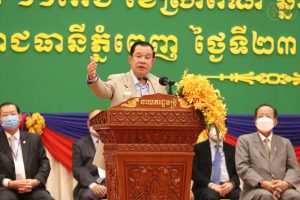Cambodia’s government is gearing up to hold another mass trial of opposition activists and government critics, as the country moves toward national elections next year. On Monday, the local media outlet VOD English reported that 34 people have been charged with plotting against the government, in connection with a failed attempt of exiled opposition figure Mu Sochua to return to the country in 2020.
All of the 34 are former leaders or supporters of the Cambodia National Rescue Party (CNRP), which was banned in 2017, after scoring significant gains at a national election in 2013. Among those charged are eight prominent exiled CNRP leaders, including the party’s former president Sam Rainsy and former vice president Mu Sochua, who have both already been convicted multiple times on a variety of charges. The case will also involve several CNRP activists who are already in prison.
VOD cited defense lawyer Sam Sokong as saying that the charges related to Mu Sochua’s attempt to return to Cambodia in 2020 to face trial in a separate trumped-up case against her, which the government has characterized as a plot to to overthrow the ruling Cambodian People’s Party (CPP).
Describing the exiled CNRP officials as “ringleaders,” the pro-government Khmer Times reported that “the conspiracy case took place in 2020 and, it is alleged, plans were hatched to return to Cambodia to overthrow the legitimate government in 2021.” Sam Sokong told VOD that the group is due to be tried on September 15.
The mass trial will be the third that the Cambodian government has held over the past three years, in which more than 100 former CNRP politicians and activists have been charged with treason and incitement for a number of alleged – which is to say, largely confected – coup plots.
It is no surprise that the government is wrenching the screws home now, given that Cambodia has entered into the waxing phase of its five-yearly electoral cycle. In June, Prime Minister Hun Sen and the CPP scored an expected landslide victory in commune-level elections, a preparation for the national elections that are due next July.
The only significant opposition party to run in the election was the Candlelight Party (CLP), the latest incarnation of the opposition party formed by Sam Rainsy in 1995, which succeeded in winning a creditable 22.3 percent of the popular vote which the CPP has permitted to re-engage in politics in place of the outlawed CNRP. (It helps that the party’s former leaders are now scattered and divided.)
But as the next national election approaches, and Hun Sen begins to gradual process of handing over power to his eldest son, Hun Manet, the Cambodian government is doing what it can to ensure that political developments don’t veer off script.
This has involved two primary strategies. The first is to ensure that the CLP remains within its allotted boundaries and does not evolve into a CNRP-style challenger with the ability to mobilize a significant chunk of the Cambodian electorate. The government has already begun harassing and arresting CLP activists at the local level, while also suing one of the party’s leaders over claims that the commune election was unfair.
The second strategy is to neutralize the domestic influence of the CNRP’s exiled former leaders. One of the few weapons remaining to them is their ability to mobilize the attention of Western governments, and encourage them to impose sanctions and other forms of pressure on Hun Sen’s government. While the government is mostly powerless to affect this international lobbying effort – despite throwing good cash after bad in its attempt to launder its reputation in Washington – its current mass trials send the message that any intercourse with exiled leaders will be treated as collusion with hostile foreign forces.

































